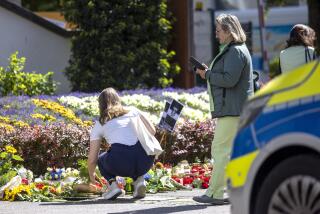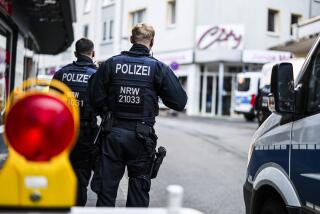Murder Trial Begins for 2 German Skinheads : Neo-Nazism: They are accused of arson attack on Turkish family. The case symbolizes the nation’s unfinished battle with its history.
SCHLESWIG, Germany — Shielded by bulletproof glass, two sullen young skinheads went on trial Monday for the murders of a Turkish grandmother and two girls whose fiery deaths became a symbol of united Germany’s unfinished battle with its own cruel history.
Michael Peters, 25, and Lars Christiansen, 19, could face life in prison if found guilty of carrying out the single deadliest attack to date in a continuing wave of right-wing violence in united Germany.
“This is also about whether people who don’t have German citizenship can go on living in Germany,” assistant prosecutor Hans-Christian Stroeble said of the trial, which is expected to last six weeks. “The story doesn’t end here. You read about new attacks almost daily.”
Their hair grown back and the skinhead uniform of bomber jackets and steel-toed boots replaced by T-shirts and jeans, the two youths entered no formal pleas Monday.
With the trial moved to this seaside city, no obvious members of the skinhead scene turned out to protest or watch the trial. Police searched all reporters and spectators entering the building.
Both defendants confessed when arrested shortly after the Nov. 23 arson attack in picturesque Moelln, but Christiansen has since recanted, and his attorney claimed Monday that “he wasn’t even there.”
Ahmet Arslan, 26, whose mother, sister and niece died in the attack, stood on the courthouse lawn after the four-hour opening session and glowered.
“How do you think it makes me feel to sit there and look at those two?” he demanded. “I’d just like to be left alone in a room with them.” His father, Nazim Arslan, still lives in Moelln, his home for the past 24 years.
Bahide Arslan, 51, her 10-year-old granddaughter Yeliz, and 14-year-old Aysse Yilmaz, a relative visiting from Turkey, died in the midnight fire that also injured several other residents of the apartment house, including an 8-year-old boy who fractured his leg jumping to safety.
Under questioning by the presiding judge, prosecuting attorneys and their own lawyers, the two defendants described their infatuation with a skinhead scene that revolved around heavy drinking, racist rock music, contempt for foreigners and admiration for Adolf Hitler.
Peters said that he joined the far-right National Democratic Party when a friend took him to a local meeting but denied that he was a true believer despite decorating his apartment with posters, bumper stickers, flags and paintings bearing outlawed Third Reich insignias.
“I was hoping for free beer,” he said when asked why he attended the meetings. He stopped, he said, “because the meetings were boring and there was no free beer.”
Christiansen maintained that he had stopped believing neo-Nazi propaganda a couple of years after shaving his head and joining the skinhead scene at 15, but he remained with the group “because I had no other friends.”
He denied any involvement with organized right-wing political parties and said he had “never said personally to a foreigner that they should get out (of Germany).”
“I am not a neo-Nazi and I’m not violent,” he asserted, discounting prosecution claims that he had participated in firebombings and the beating of a foreign child prior to the Moelln attack.
Police in Moelln reported that shortly after midnight Nov. 23, an anonymous caller reported a fire in an apartment house inhabited by foreigners. “Heil Hitler!” the man cried before hanging up. The people in that building all escaped.
But Christiansen and Peters were allegedly already on their way to No. 9 Muehlenstrasse, where Molotov cocktails landed in a stairwell, trapping screaming residents upstairs behind the flames. Some jumped to safety; others were rescued. Three died.
The Moelln attack was the horrifying climax to united Germany’s worst year of right-wing violence, a year marked by more than 2,000 attacks that left 17 people dead and scores more injured as drunken young thugs terrorized foreign asylum-seekers.
The worst single attack yet, Moelln also proved to be an emotional turning point for the nation, not only because children were killed for the first time but also because the victims were members of Germany’s large, long-established Turkish minority--people whose imported labor had helped produce Germany’s astounding postwar “economic miracle.”
While small numbers of ordinary Germans had often passively watched and sometimes even applauded earlier neo-Nazi and skinhead assaults, public outrage and shame over the Moelln murders quickly brought millions of Germans to the streets in candlelight protests against the racism.
Chancellor Helmut Kohl’s government, under heavy criticism at home and abroad for ignoring the dangerous surge in far-right extremism, launched a crackdown against both the political organizations and the street gangs.
Four neo-Nazi parties were banned and at least two of their leaders were stripped of their civil rights. Weapons and outlawed Third Reich memorabilia were seized in several police raids of so-called “Nazi nests.”
This month, the Bundestag--lower house of Parliament--is expected to adopt new laws to staunch the flood of mostly economic refugees from former East Bloc and Third World countries.
As it stands, Germany’s asylum process is considered the most liberal in the industrialized world. Anyone requesting political asylum is automatically guaranteed food, shelter and social benefits in Germany while their case is being reviewed--no matter how suspicious their claim may be.
Efforts are now under way to ease a bureaucratic bottleneck that led to a backlog at one point of about 400,000 cases, which meant asylum applicants were being supported by German taxpayers for months and often years. Ultimately, only 5% of asylum claims are ruled legitimate.
The new law would automatically declare some countries free of persecution and its citizens therefore ineligible to even apply for asylum in Germany.
More to Read
Sign up for Essential California
The most important California stories and recommendations in your inbox every morning.
You may occasionally receive promotional content from the Los Angeles Times.










